President Trump Announces Nomination of Pete Hegseth for Defense Secretary
Understandable selection. President Trump has announced the nomination of Pete Hegseth to be Secretary of Defense.
[Source]
Remember, under the Trump Doctrine, the use of the military takes a backseat to the deployment of economic weapons to achieve national security objectives. From this fundamental outlook, the Secretary of Defense needs to maintain a strong military, but only for use as a last resort when called upon.
If triggered for reasons of extreme national security, the Defense Department under Commander in Chief Donald Trump is expected to deliver much faster, harsher and a more directed forceful response. This was on display in Syria, 2017, when ISIS was destroyed in weeks; and then followed up with the first ever dropping of a ‘MOAB’, the Mother of All Bombs.
With this intent in mind, Pete Hegseth needs to harden the warriors and prepare them only in the event that all other approaches by President Trump have not led to the optimal outcome. This approach scares the crap out of militaristic nations who were stuck in the old ‘red line’ paradigm.
The Trump Doctrine – President Trump executed a foreign policy, a clear doctrine of sorts, where national security is achieved by leveraging U.S. economic power. It is a fundamental shift in approaching both allies and adversaries; summarized within the oft repeated phrase: “economic security is national security.”
Initially, given the nature of multiple military entanglements, a traditional military approach toward national security could not easily be reversed or dispatched. Defense Secretary James Mattis became a bridge to a new path forward.
President Trump removed military constraints, allowed rules of engagement that were much stronger, and let Secretary Mattis work on confronting and stamping out terror threats. In essence, an aggressive “let’s get this over with” approach. However, that strong-arm military approach cannot continue indefinitely because it just never ends.
Secretary Mattis was one voice who did not want it to end. Hammers are useless without nails. War and intervention have a long history of unnecessarily expanding if not constrained. The war machine turns into a military business. So, President Trump removed him.
President Trump, campaigned on a desire to bring U.S. troops home from all the “stupid wars”, in part because they are also “expensive wars.” And as a direct consequence the time for Defense Secretary Mattis’s of the world was sure to come to an end. Many of the Generals hated him for it.
Two large elements played out when Trump was in office. First, economic security is national security. Second, “peace is the prize.”
Through both elements the Trump Doctrine was born and the effectiveness, while downplayed and ignored, was unmistakable.
♦President Trump’s foreign policy approach brought North and South Korea together away from the table of conflict. ♦President Trump’s foreign policy approach brought Serbia and Kosovo together away from the table of conflict. ♦President Trump’s foreign policy rallied the Gulf Cooperation Council to stop Qatar’s support for Islamic extremists via the Muslim Brotherhood. ♦President Trump’s foreign policy brought Turkey and the Kurdish forces together away from war and conflict. ♦President Trump’s foreign policy created a ceasefire to stop the bloodshed in Syria. President Trump mediated a cessation of hostilities between India & Pakistan in the Kashmir region. ♦President Trump’s foreign policy brought Israel and the UAE together… and then Bahrain… and then Sudan in the Abraham Accords.
President Trump executed a clear foreign policy, a unique doctrine of sorts, where national security is achieved by leveraging U.S. economic power. It was a fundamental shift in approaching both allies and adversaries; summarized within the oft repeated phrase: “economic security is national security.”
The Trump Doctrine of using economics to achieve national security objectives was a fundamental paradigm shift. Modern U.S. history provided no easy reference for the effective outcome.
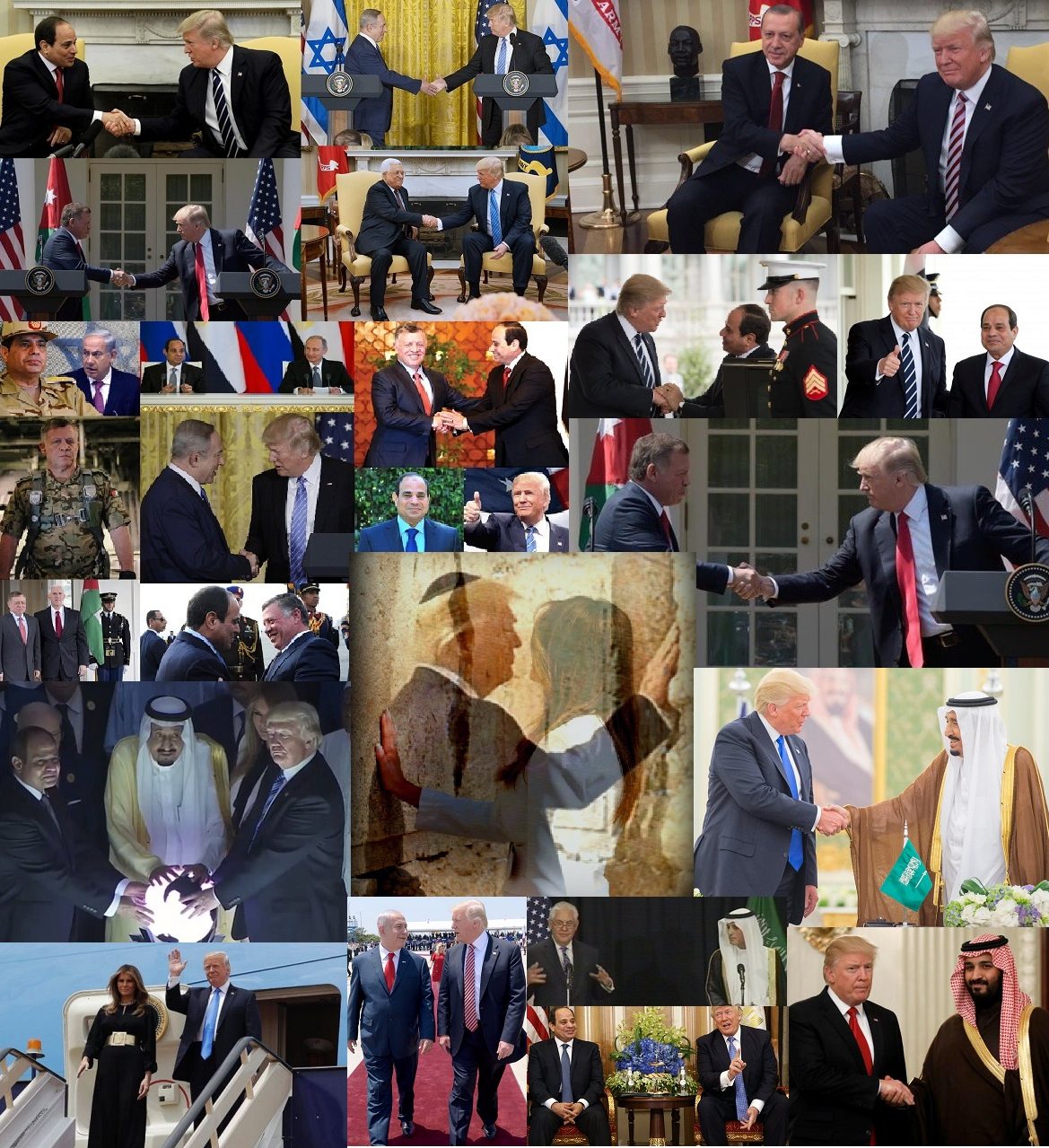 The nature of the Trump foreign policy doctrine, as it became visible, was to hold manipulative influence agents accountable for regional impact(s); and simultaneously work to stop any corrupted influence from oppressing free expression of national values held by the subservient, dis-empowered, people within the nation being influenced.
The nature of the Trump foreign policy doctrine, as it became visible, was to hold manipulative influence agents accountable for regional impact(s); and simultaneously work to stop any corrupted influence from oppressing free expression of national values held by the subservient, dis-empowered, people within the nation being influenced.
There were clear examples of this doctrine at work. When President Trump first visited the Middle East, he confronted the international audience with a message about dealing with extremist influence agents. President Trump simply said: “drive them out.”
Toward that end, as Qatar was identified as a financier of extremist ideology, President Trump placed the goal of confrontation upon the Gulf Cooperation Council, not the U.S.
The U.S. role was clearly outlined as supporting the confrontation. Saudi Arabia, Kuwait, Egypt, Bahrain and the United Arab Emirates needed to confront the toxic regional influence; the U.S. would support their objective. That’s what happened.
Another example: To confront the extremism creating the turmoil in Afghanistan, President Trump placed the burden of bringing the Taliban to the table of governance upon primary influence agent Pakistan.
Here again, with U.S. support. Pakistan was the leading influence agent over the Taliban in Afghanistan; the Trump administration correctly established the responsibility and gave clear expectations for U.S. support.
If Pakistan doesn’t change their influence objective toward a more constructive alignment with a nationally representative Afghanistan government, it was Pakistan who will be held accountable.
Again, the correct and effective appropriation of responsibility upon the influence agent who can initiate the solution, Pakistan.
The process of accurate regional assignment of influence comes with disconcerting sunlight. Often these influences are not discussed openly. However, for President Trump the lack of honesty is only a crutch to continue enabling poor actors. This is a consistent theme throughout all of President Trump’s foreign policy engagements.
The European Union is a collective co-dependent enabler to the corrupt influences of Iran. Therefore, the assignment of responsibility to change the status was placed upon the EU.
The U.S. would fully support the EU effort, but as seen in the withdrawal from the Iran Deal, President Trump would not enable growth of toxic behavior. The U.S. stands with the people of Iran, but the U.S. will not support the enabling of Iranian oppression, terrorism and/or dangerous military expansion that will ultimately destabilize the region.
President Trump made the policy clear, then held the EU accountable for helping to influence change. Again, we saw the Trump Doctrine at work.
 Perhaps the most obvious application of the Trump Doctrine was found in how the U.S. administration approached the challenging behavior of North Korea. Rather than continuing a decades-long policy of ignoring the influence of China, President Trump directly assigned primary responsibility for a DPRK reset to Beijing.
Perhaps the most obvious application of the Trump Doctrine was found in how the U.S. administration approached the challenging behavior of North Korea. Rather than continuing a decades-long policy of ignoring the influence of China, President Trump directly assigned primary responsibility for a DPRK reset to Beijing.
China held, and holds, all influence upon North Korea and has long treated the DPRK as a proxy province to do the bidding of Beijing’s communist old guard.
By directly confronting the influence agent and admitting openly for the world to see (albeit with jaw-dropping tactical sanction diplomacy) President Trump positioned the U.S. to support a peace objective on the entire Korean peninsula and simultaneously forced China to openly display their closely guarded influence.
While the Red Dragon -vs- Panda influence dynamic was quietly playing out in the background, the benefit of this new and strategic approach brought the possibility of peace between the two Koreas’ closer than ever in history.
No longer was it outlandish to think of North Korea joining with the rest of the world in achieving a better quality of life for its people.
Not only was President Trump openly sharing a willingness to engage in a new and dynamic future for North Korea, but his approach is removing the toxic influences that have held down the possibility for generations.
By leveraging China (through economics) to stop manipulating North Korea, President Trump was opening a door of possibilities for the North Korean people. This is what I meant when I said Trump was providing North Korea with an opportunity to create an authentic version of itself.
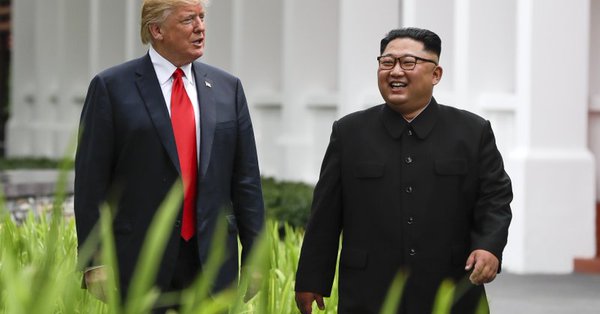 What ultimately came from the opportunity President Trump constructed was lost in the 2020 U.S. election outcome. However, the opportunity itself was stunning progress creating a reasonable pathway to prosperity for the North Korean people.
What ultimately came from the opportunity President Trump constructed was lost in the 2020 U.S. election outcome. However, the opportunity itself was stunning progress creating a reasonable pathway to prosperity for the North Korean people.
Chairman Kim Jong-un had the opportunity to be the most trans-formative leader within Asia in generations; but it was always only an ‘opportunity’ that could exist if President Trump remained in place to provide it.
Whether Kim Jong-un could embrace openness, free markets and prosperity was never seen. But we saw the opportunity that was nonexistent without Trump’s guiding hand to create it.
♦The commonality in those foreign policy engagements was the strategic placement of responsibility upon the primary influence agent; and a clear understanding upon those nation(s) of influence, that all forward efforts must ultimately provide positive results for people impacted who lack the ability to create positive influence themselves.
One of the reasons President Trump was able to take this approach was specifically because he was beholden to no outside influence himself.
It is only from the position of complete independence that accurate assignments based on the underlying truth can be made; and that took us to the ultimate confrontations – the trillion-dollar confrontations.
A U.S. foreign policy that provides the opportunity for fully realized national authenticity was a paradigm shift amid a world that had grown accustomed to corrupt globalists, bankers and financial elites who have established a business model by dictating terms to national leaders they control and influence.
We had/have our own frame of reference with K-Street lobbyists in Washington DC. Much of President Trump’s global trade reset was based on confronting these multinational influence agents.
When you take the influence of corporate/financial brokers out of foreign policy, all of a sudden, those global influence peddlers are worthless. Absent of their ability to provide any benefit, nations no longer purchase these brokered services.
As soon as influence brokers are dispatched, national politicians become accountable to the voices of their citizens. When representing the voices of citizens becomes the primary political driver of national policy, the authentic image of the nation is allowed to surface.
In western, or what we would call ‘more democratized systems of government‘, the consequence of removing multinational corporate and financial influence peddlers presents two options for the governing authority occupying political office:
♦ One option was to refuse to allow the authentic voice of a nationalist citizenry to rise. Essentially to commit to a retention of the status quo; an elitist view; a globalist perspective. This requires shifting to a more openly authoritarian system of government within both the economic and social spheres. Those who control the reins of power refuse to acquiesce to a changed landscape.
♦The second option is to allow the authentic and organic rise of nationalism. To accept the voices of the middle-class majority; to structure the economic and social landscape in a manner that allows the underlying identity to surface naturally.
Fortunately, we are living in a time of great history, and we had multiple examples surfacing around the world. Prior national elections in Poland, Hungary, Italy, Brazil and right here in the U.S. via Donald Trump highlighted responses to dysfunctional multiculturalism and financial influences from corrupt elites within the institutions of globalist advocacy: The International Monetary Fund (IMF), the World Bank, and the World Trade Organization (WTO).
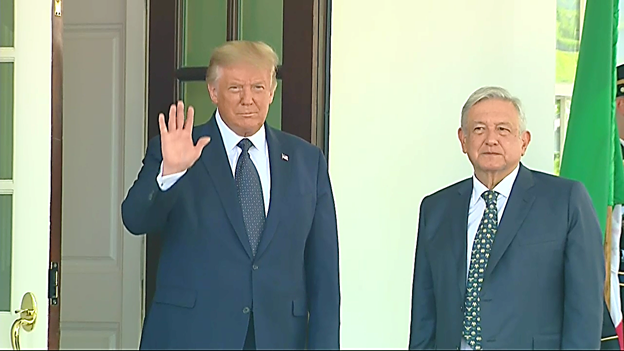 Two specific reference points played out in real time. One was the U.K. and voices of the British people who voted to Brexit the European Union. The second was Mexico, and the July 1st, 2018, election of Andres Manuel Lopez-Obrador (aka AMLO), a nationalist.
Two specific reference points played out in real time. One was the U.K. and voices of the British people who voted to Brexit the European Union. The second was Mexico, and the July 1st, 2018, election of Andres Manuel Lopez-Obrador (aka AMLO), a nationalist.
In the U.K. we saw the government turning more authoritarian and distancing itself from the voices of the majority who chose to rebuke the collective association of the EU. Initially, the U.K. government took a harsher approach toward suppressing opposition, and as a consequence oppressing free speech and civil liberties. [Insert the example of Tommy Robinson here – there are many others.]
This did not come as a surprise to those who follow the arc of history when the collective global elite are challenged or rejected. Globalism can only thrive amid a class structure where the elites, though few in number, have more controlling power over the direction of government.
It is not accidental the EU has appointed officials and unelected bureaucrats in Brussels as the primary decision-making authority. By its very nature the EU collective requires a central planning authority who can act independent of the underlying national voices.
As the Trump Doctrine clashed with the European global elite, the withdrawal of the U.S. financial underwriting created a natural problem. Subsidies are needed to retain multiculturalism. If a national citizenry has to pay for the indulgent decisions of the influence class, a crisis becomes only a matter of time.
Wealth distribution requires a host.
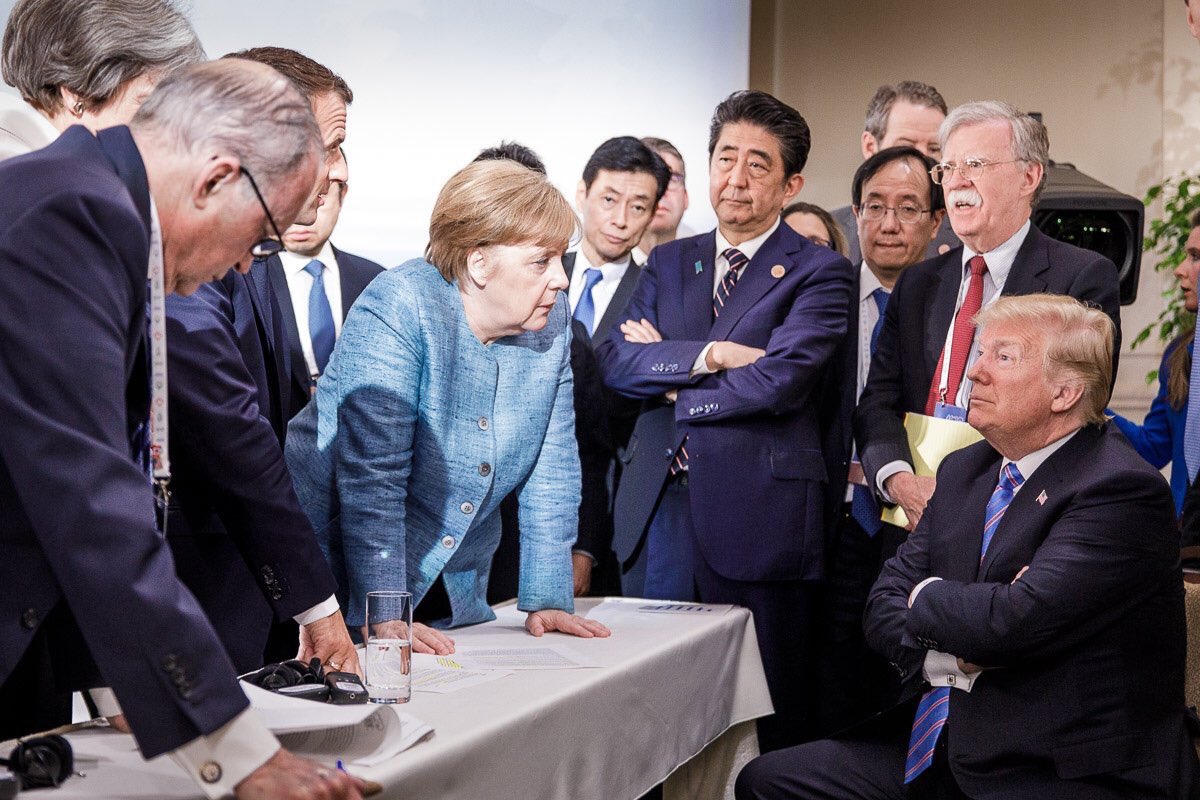 Since the end of World War II, the U.S. had been a bottomless treasury for EU subsidy. The payments have been direct and indirect. The indirect have been via U.S. military bases providing security, the NATO alliance, and also by U.S. trade policy permitting one-way tariff systems. Both forms of indirect payment were being reversed as part of the modern Trump Doctrine.
Since the end of World War II, the U.S. had been a bottomless treasury for EU subsidy. The payments have been direct and indirect. The indirect have been via U.S. military bases providing security, the NATO alliance, and also by U.S. trade policy permitting one-way tariff systems. Both forms of indirect payment were being reversed as part of the modern Trump Doctrine.
Similarly, in Mexico the Trump Doctrine extended toward changed trade policies, this time via NAFTA.
The restructuring of NAFTA into the USMCA disfavors multinational corporations and financial holdings who have exploited structural loopholes that were designed into the original agreement.
With President Trump confronting the NAFTA fatal flaw, and absent of the ability of corporations to influence the direction of the administration, the trade deal ultimately presented the same outcome for Mexico as it does the EU – LESS DOLLARS.
However, in Mexico, the larger systems of government were not as strongly structured to withstand the withdrawal of billions of U.S. dollars. The government of Mexico is not in the same position as the EU and cannot double-down on more oppressive controls. Therefore, the authentic voice of the Mexican people was more likely to rise.
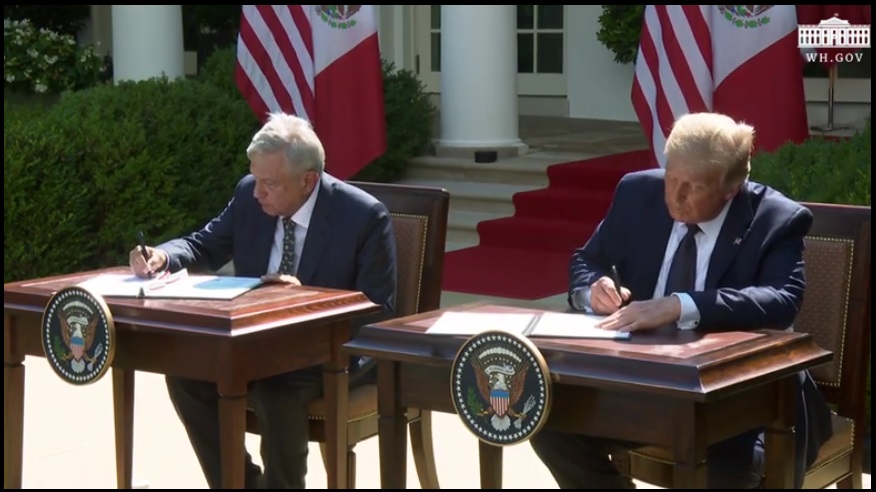 Andres Manuel Lopez Obrador (AMLO) is a nationalist, but he is not a free-market capitalist. AMLO is more akin to soft-socialist approach with a view that when the central governing authority is constrained, and operates in the best interests of its citizens, equity can be achieved.
Andres Manuel Lopez Obrador (AMLO) is a nationalist, but he is not a free-market capitalist. AMLO is more akin to soft-socialist approach with a view that when the central governing authority is constrained, and operates in the best interests of its citizens, equity can be achieved.
The fabric of socialism runs naturally through the DNA strain of Mexico, and indeed much of South America. This is one of the reasons why previous Mexican governments were so corrupt. Multinational corporations always find it easier to exploit socialist minded government officials.
When bribery and graft are the natural way of business engagement, the multinationals will exploit every opportunity to maximize profit. Withdraw the benefit (loophole exploitation) to the financial systems, and the bribery and graft dries up quickly. A bottom-up nationalist like AMLO, is the ultimate beneficiary.
The authentic-sense of the Mexican people rises in the persona of Andres Manuel Lopez Obrador – who actually does personify the underlying nature of the classic Mexican class-struggle.
Thus, we saw two similar yet distinct outcomes of the Trump Doctrine. Within a highly structured U.K. parliamentary government the leadership becomes more authoritarian and rebukes the electorate; and in Mexico a less structured government becomes more nationalist, more prideful, and embraces the underlying nature of the electorate.
It is not accidental the historic nature of the U.K. is a monarchy (top down), and the historic nature of Mexico is populist (bottom up). Revolution notwithstanding, both countries responded to the Trump doctrine by returning to their roots.
REMINDER April, 2018 – SEOUL (Reuters) – South Korean President Moon Jae-in said U.S. President Donald Trump deserves a Nobel Peace Prize for his efforts to end the standoff with North Korea over its nuclear weapons program, a South Korean official said on Monday.
“President Trump should win the Nobel Peace Prize. What we need is only peace,” Moon told a meeting of senior secretaries, according to a presidential Blue House official who briefed media.
Moon and North Korean leader Kim Jong Un on Friday pledged at a summit to end hostilities between their countries and work toward the “complete denuclearization” of the Korean peninsula.


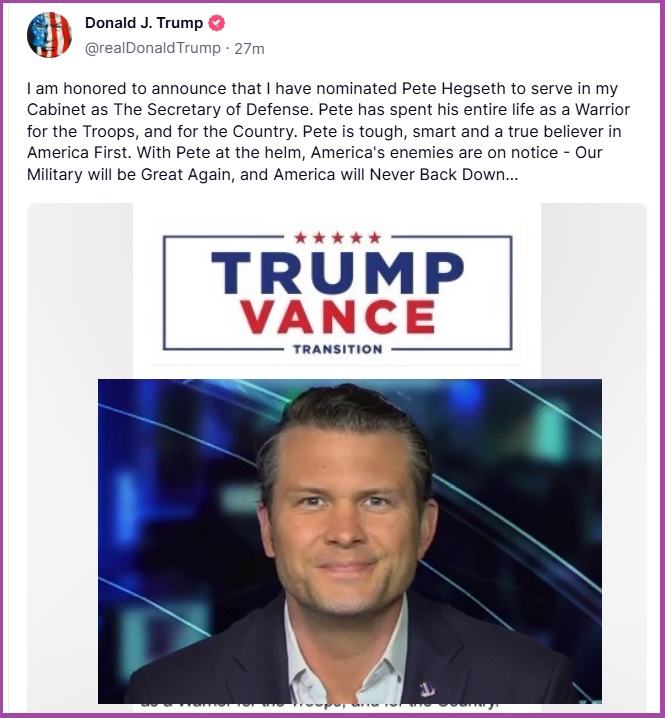


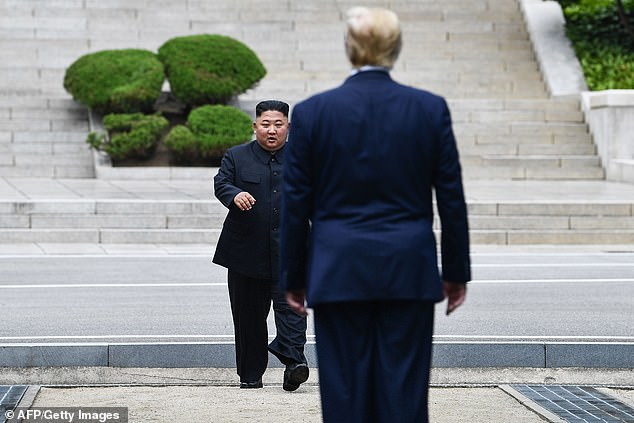



Post a Comment